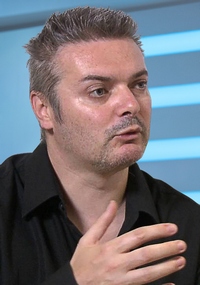Kevin Johnson is head, Innotribe Innovation Programs, SWIFT. Innotribe was created to identify emerging trends in financial services innovation and generate discussions about how these trends could impact the industry going forward. He speaks to Banking Frontiers at SIBOS 2016 in Geneva
Babu Nair: What is your definition of innovation?

Kevin Johnson
points out that the biggest trend today is digitization and this is not necessarily about technology but about business processes
Kevin Johnson: When people speak about innovation, they go straight into technology. However, if you look from our perspective, it’s all about business. It’s about enabling business. Every technology is fine and shiny but if it does not solve fundamental business problems, it is a distraction. IT should fundamentally transform the way we do business. Inside SWIFT, the case in point is the Global Payments Innovation, or GPI, initiative where we have a deep look at our customers and their problems and then work with the community to address it. It’s about security, speed, green initiatives, transparency, scalability and how do you use that in the industry. It is not about re-inventing the wheel. It is about doing incremental innovation to bring dramatic changes. It’s not the end. If we wanted to start it afresh grounds up, it would take 3 to 4 years to get there and business would lose its advantages. Instead of releasing anything that is 100% right, prioritize the benefits and features.
We are inspired by startups working using green methodologies and working incrementally, trying to solve business problems. If you look at where the industry will be, it will be ideal to know where we will be 5 years from now and how to get there. From Innotribe’s perspective, it is not technology at all. It is business model innovation to identify where we will be 5 to 7 years from now and then reach there incrementally with our community. We don’t do in a single leap. Industry has huge level of investments and capabilities and these capabilities can be used very well to get you to the objectives.
What are the key innovation trends across the world?
The biggest trend we saw is about digitization where we move from manual paper process to digitized process. This is not necessarily about technology but business processes. We have been working with startups since 2009. Fintech was a word sort of appearing then and the first wave of fintech was focusing on cutting edge cases, attacking, disrupting. Now we are talking that it is about collaboration and we see this as the transformation that is happening in fintech 2.0.
A leading venture capitalist told me without the banks, there is no fintech. The fintechs have a symbiotic relationship with the industry. It’s about the collaborative mindset from the startups but it is also about industry working together with these fintechs to solve the business problems and deliver the results.

What are the challenges for the industry and the fintechs?
Innovation is no longer a side show but it is the core of the business. Look at Sibos. It is one of the most fintech-oriented conclave with over 50 innovators sharing their innovations. We have about 25 innovators from the Swiss ecosystem here and they are all here because they want to work with the industry. Innotribe works as a connector. The industry is a very large and when it moves, it does so with a tremendous power to make transformation. It needs energy. The startup is a smooth operator spinning at hundreds of miles an hour. You put them both together and it creates amazing result.
Our initiatives like the Fintech Foundation are attempts to act as a facilitator to bring both of them together. It’s about working with startups to help them understand what the industry is looking for. Startups will come with great ideas and our job is to ask what business does it enable, what problem does it solve. If they cannot answer that, no businesses will speak to them.
We find startups coming through the startup challenge and they go through coaching and the coaching is not driven by innovation. It is coaching from the inside of the industry to explain how to speak to the industry. They give an inside view on a one on one conversation. That is the role Innotribe plays by connecting the fast paced fintech work with the understanding of the industry to make the desired impact.
How do you empower the fintechs with regulators across geographies?
Innotribe believes in creating communities and managing ecosystems. We create ecosystems to bring people together and the ecosystems take care of the members themselves. It is virtually impossible for a single entity to do everything. It is not about us taking a position. If one of the UK companies has to go to work in Singapore, there is MAS, which is the regulator. We have connects with MAS. Through the Fintech Foundation, we take this relationship further. For us to come and fully understand the regulatory framework and mentor accordingly, it is difficult due to constantly changing regulatory framework. When we work with startups, we prefer to keep them local as they understand the local market, local compliance and regulatory frameworks. We don’t create communities, we work with communities on the ground and link or connect them together.
What are the innovations in the financial inclusion and cooperation realms?
Mobile first and mobile only. There are communities in Africa which have no access to basic infrastructure and mobile is the strongest and only platform.
So you mean to say that the mobile is leapfrogging into digital inclusion?
I think this is already happening in Africa. Many people there have smart phones but no bank accounts. There are several refugees and economic migrants and you realize that it is necessary to develop tools and apps for this new generation.
What according to you are the major factors that define innovation?
From the application side, the first thing that I can think of is artificial intelligence. Use artificial intelligence to make sense of data. On the flip side, the size of the data we have has to be looked into seriously. It’s quality of data that can empower you to take a right decision. This again connects us to the basic technique of the business problem – what is it that this will enable you to do? I think as world is moving into real time and leveraging artificial intelligence to make information out of data is going to be the key thing.
At every platform level, SWIFT plays a role and this is where you will see innovations coming in. This needs serious collaboration between industry and technology. I see innovation starting there, building through the framework of a strong foundation. If this foundation is not strong, what you build on top is on shaky grounds. In this layer you find compliance solutions, networking solutions and security solutions.
This needs to be done at a community level and individual organizations will not stand to benefit. Such organizations need to come together as a community, build it up together after understanding which business challenges it enables. It is all about platform economics. You build fundamental building blocks. To assemble them, you have business enabling innovations and integrate these with unique business propositions and you will have the new product.
How easy or challenging is the question of funding?
Globally, $19 billion went into funding fintech last year. Yes, there is funding but it is not evenly spread. Another thing at the Fintech Foundation we are doing is to identify which entity to fund – Silicon Valley enterprises or those in London or elsewhere. It depends on what you are specializing and then attract right talent for funding. The industry is also coming together and funding this from a business enabling point of view. They are not coming as the traditional venture capitalist perspective of ‘let’s go in and make value in 4 years’. They come from a perspective of what is it that we can invest in so as to make strategic long term returns. Lot of institutions here at Sibos have a venture unit and a startup incubator attached together. If you look deeply inside, you can find speculative bets but you also find a number of them which are insightful and help them solve strategic long term problems. If you are looking for funding here, start with a problem, make sure it is industry relevant and ensure that you can really address the business problem. The chances of getting funds are the highest.
What about scalability of the fintechs?
It is dependent on problems they are rightly solving. We see more and more ideas emerging out of large and small fintech companies which are able to scale because they are working with the industry. It is hard to sell an idea by a small player, but when several of them work in an industry ecosystem, it is scalable. It is not about ambition but about humbleness. They must demonstrate that they are working with an understanding where the industry needs to be, where challenges are there.
There are many issues that can be solved with collaboration of big and small players. Those teams that have understood the problem may be able to solve it. But that does not lead to any transformation. So, I say there is tremendous scope in collaborating and solving problems as a team. Venture capitalists ideally invest in teams with potential and those that can offer a whole value proposition.
What could be some of reasons for failure?
The main reason is not understanding the problem. I am seeing this for the last three years that often people come to you saying that they have a wonderful solution and asking me whether I have a problem that this can solve. It’s all about understanding the problem before you start with the solution. Fundamentally, if you are not solving a problem you haven’t got the business.
There would be some very strong innovations. For example, Steve Jobs never focused on groups that tell him what they wanted, or visionaries like Henry Ford, who said ‘If I would have asked people what they want, they would tell that they needed faster horses instead of a car’. But there are very few innovations that could make that sort of confirmations and to do so you need to really understand what enables it as opposed to the saying that ‘I have a shiny technology. Do you think you know what kind of your problems this technology can fix?
How do you distinguish between intrapreneur and entrepreneur?
I just ask ‘Are you are solving any problem?’ Irrespective of whether it is intrapreneur or entrepreneur, if you are solving the problem, you are there to stay.
What is the road ahead for Innotribe?
We are for the community and we are running Innotribe for the last eight to nine years and it running strong. This reception means there is a strong desire to do this from an industry perspective – as a mission. We are going to all the edges of our ecosystem and looking out. We are looking out 2 to 5 years into the future to figure out what is coming next not just in areas of finance. We are also looking out into other regulated areas such as medicine, get inspired and see if they make relevance to our industry and explore how can these be adapted to actionable areas for our industry. Our role is to go out, find those innovations, translate them to make them relevant and bring them to our community. Platforms such as Sibos understand and take action on them. If you visit any of the Innotribe’s activities, it won’t just be bankers talking to you, it will be people from various areas talking to you about what it means for financial services. It is about being inspired broadly and then bringing back to how it can be made more relevant to the financial services sector. We have 50 innovators sharing innovations here.
What is your activity in India?
Innotribe has done events in India. Whatever we do is for the global marketplace and is open to innovators there as well. India is quite a large population and ignoring innovations from there is quite naive. Having said that, ours is quite a small team. It is therefore important for the innovators to make enough noise and market themselves to seek attention to take them to the next level.







